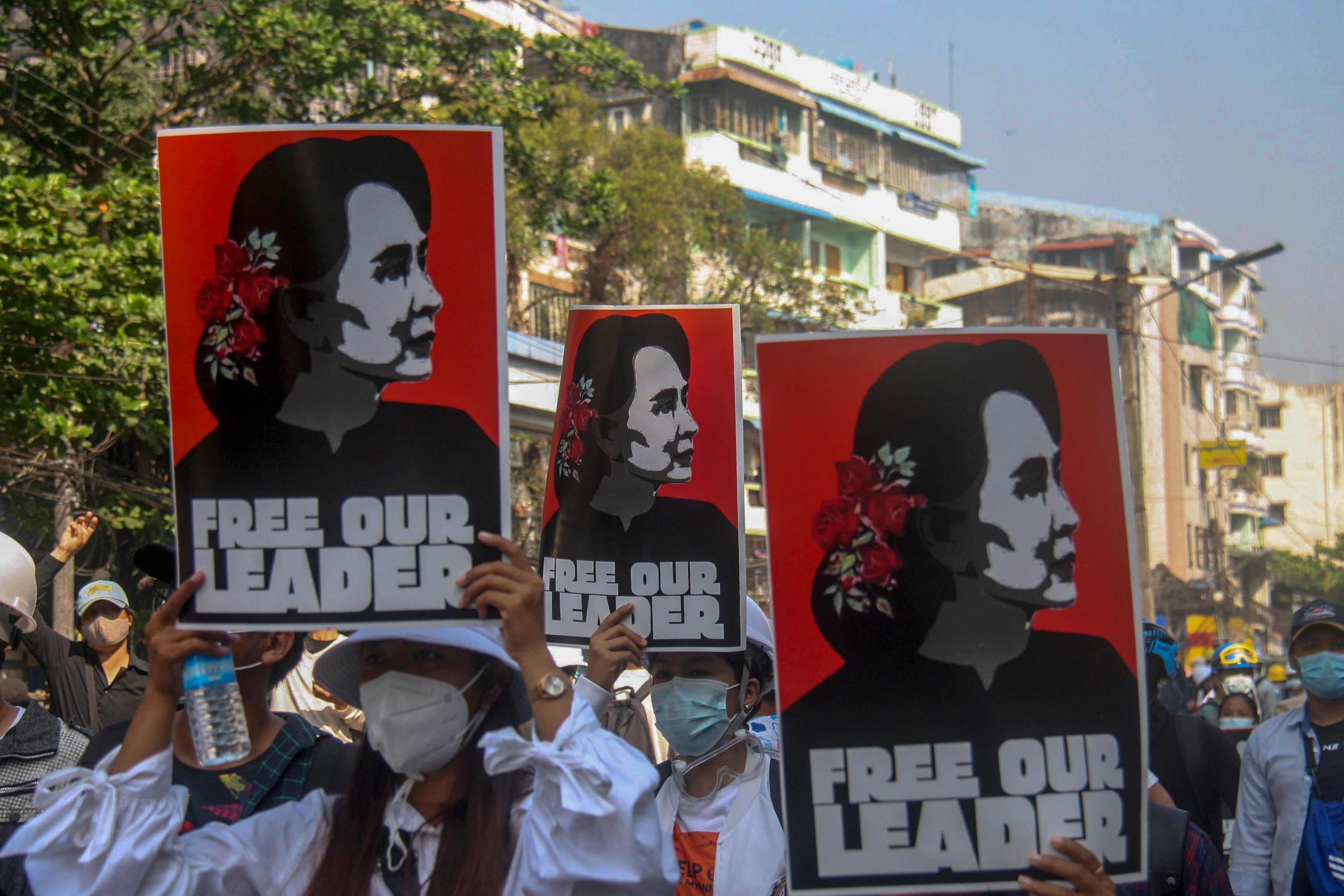Southeast Asian nations urge halt to violence in Myanmar
Southeast Asian foreign ministers are urging a halt to violence and the start of talks on a peaceful solution in Myanmar, where the military seized power from an elected government and is escalating its use of mass arrests and deadly force against peaceful protesters

Your support helps us to tell the story
From reproductive rights to climate change to Big Tech, The Independent is on the ground when the story is developing. Whether it's investigating the financials of Elon Musk's pro-Trump PAC or producing our latest documentary, 'The A Word', which shines a light on the American women fighting for reproductive rights, we know how important it is to parse out the facts from the messaging.
At such a critical moment in US history, we need reporters on the ground. Your donation allows us to keep sending journalists to speak to both sides of the story.
The Independent is trusted by Americans across the entire political spectrum. And unlike many other quality news outlets, we choose not to lock Americans out of our reporting and analysis with paywalls. We believe quality journalism should be available to everyone, paid for by those who can afford it.
Your support makes all the difference.Southeast Asian foreign ministers urged a halt to violence and the start of talks on a peaceful solution in Myanmar, where the military seized power from an elected government and is escalating its use of mass arrests and deadly force against peaceful protesters.
Myanmar's top diplomat briefed other foreign ministers from the Association of Southeast Asian Nations during a video conference Tuesday, according to the meeting's agenda.
It was the first meeting of foreign ministers of the 10-member ASEAN since the Feb. 1 coup, when Myanmar's military detained Aung San Suu Kyi and other leaders.
Brunei which heads ASEAN this year, had proposed that a joint statement be issued after the meeting. But the ministers apparently failed to agree on a declaration, and Brunei issued its own chairman's statement.
“We expressed our concern on the situation in Myanmar and called on all parties to refrain from instigating further violence, and for all sides to exercise utmost restraint as well as flexibility. We also called on all parties concerned to seek a peaceful solution, through constructive dialogue," the statement said.
It also said the ministers “heard calls” for the release of political prisoners and for the U.N. special envoy on Myanmar to play a mediating role, without identifying who made those proposals.
Indonesian Foreign Minister Retno Marsudi led efforts to lobby for the ASEAN meeting. She has visited other member countries in recent weeks, including Thailand, where she held three-way talks with Thai counterpart Don Pramudwinai and Myanmar’s new foreign minister, retired army colonel Wunna Maung Lwin, who also traveled to Thailand.
“This situation is worrisome,” Marsudi said after Tuesday's meeting, “It is worrisome because an increasing number of civilians have lost their lives and are injured, it’s worrisome because there are still arrests of civilians, it’s worrisome because this situation could threaten the transition of the democratic process.”
She called for a restoration of democracy and a return to normalcy. “This ASEAN meeting was to discuss and find a solution. However, it takes two to tango. The will and goodwill of ASEAN to help will not be implemented if Myanmar does not open its doors to ASEAN,” she said.
Singapore and Malaysia have also urged Myanmar’s military junta to halt the use of violence.
Singapore Foreign Minister Vivian Balakrishnan told Parliament on Monday that his country was “appalled” by Myanmar’s use of lethal force against unarmed civilians, calling it “inexcusable.”
He said prolonged instability in Myanmar would lead to serious consequences for it and the region. He urged the release of Suu Kyi and other political detainees, saying it was the only way to jumpstart negotiations and return to the path of democratic transition.
Although ASEAN has long operated on a principle of non-interference in each other’s domestic affairs and its decisions are made by consensus, Balakrishnan said the group can play a key role in facilitating Myanmar’s return to normalcy.
Malaysian Foreign Minister Hishammuddin Hussein also urged ASEAN to play a more proactive role and said Malaysia viewed the military takeover as a setback to Myanmar’s democratic transition in the past decade. He urged the military to uphold the rule of law and respect the people’s right to peaceful assembly and freedom of expression.
“It is crucial that ASEAN leads a sincere discussion and constructively engage with Myanmar and all stakeholders to show that ASEAN is effective as a cohesive regional grouping,” he said ahead of Tuesday's meeting.
The Philippine delegation said, "Our call is for the complete return to the previously existing state of affairs,” adding that the first step should be the immediate release of Suu Kyi, followed by a dialogue.
ASEAN groups Brunei, Cambodia, Indonesia, Laos, Malaysia, Myanmar, the Philippines, Singapore, Thailand and Vietnam.
___
Associated Press journalists Eileen Ng in Kuala Lumpur, Malaysia, and Jim Gomez in Manila, Philippines, contributed to this report.